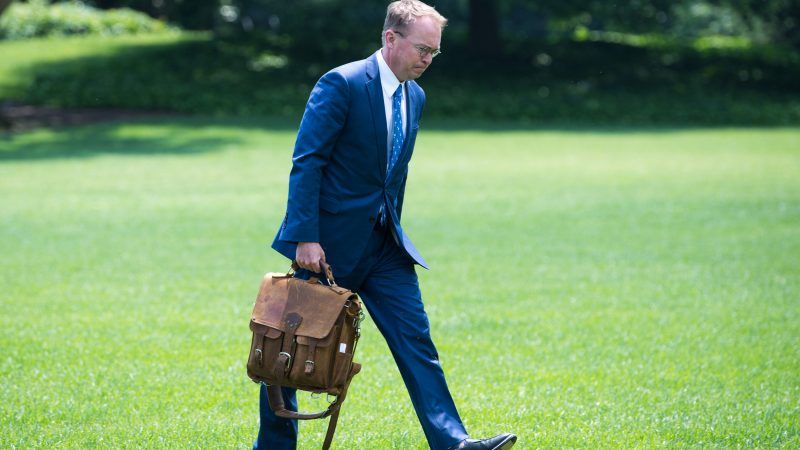Mick Mulvaney Turns His Back on Fiscal Responsibility
"Show me the majority for cutting spending," he says.

White House jack-of-all-executive-branch-positions and former Tea Party congressman Mick Mulvaney reaffirmed Tuesday that he is abandoning his interest in bringing fiscal responsibility to the federal government. Asked during a panel discussion at the Peter G. Peterson Foundation if he was still a deficit hawk, the acting chief of staff said, "Show me the majority for cutting spending."
Sadly, he probably has the politics right. As Kate Davidson wrote in The Wall Street Journal today, Republicans, Democrats, the general public, and even some economists have all lost interest in reducing deficits over the past few years.
Instead, Mulvaney argued for reducing the rate of spending growth so that revenues can grow faster than government expenditures. According to Mulvaney, sustained economic growth of 3 percent annually would make a dent in the deficit by increasing the amount of revenue the government collects.
But that sort of growth is probably unrealistic—and even if it does happen, it won't be enough to bring the budget into balance.
While the economy did grow roughly 3 percent in 2018, the Congressional Budget Office's most recent estimates suggest that real growth will average roughly 1.8 percent over the next decade. Even if you go with the Tax Foundation's more optimistic projections about the Tax Cuts and Jobs Act's impact, annual economic growth would only be an average of 0.29 percent higher over the next decade than it would be without the tax cuts.
The Committee for a Responsible Federal Budget, a nonpartisan nonproft that advocates for balanced budgets, projects that it would take at least 4.8 percent average annual growth over the next decade to balance the budget. There's "no reasonable amount of sustained economic growth that would sufficiently fix our fiscal problems," the group's president, Maya MacGuineas, tells Reason.
And while higher growth does help address the deficit in some ways, it doesn't address one of the chief sources of our long-term fiscal problem: Social Security costs. Higher incomes mean more payroll tax revenue today, but also larger Social Security benefit obligations in the future.
Strong economic growth alone can't balance the budget in the short term either. Last year saw the fastest growth in more than a decade, yet the federal government ran a $779 billion deficit. And that's not just a product of the 2017 tax cuts; the Bipartisan Budget Act of 2018 hiked federal spending by $300 billion over the next two years. By now, Republican lawmakers like Ways and Means ranking member Kevin Brady (R–Tex) are acknowledging what every major analysis of the tax cut predicted before it was passed: It will not pay for itself.
One evergreen problem with trying to impose fiscal responsibility is that the debt lacks immediate, tangible downsides—there hasn't been a meltdown yet, so why should anybody be concerned? But its long-term effects are real. According to the Congressional Budget Office, a family of four could see up to $4,000 less in annual income by 2028 if the debt rises according to projections, and up to $16,000 less in annual income by 2048.
Mulvaney might still personally believe in the need to cut expenditures, but he hasn't had much success convincing his boss of that. In Maya McGuineas' words, the acting chief of staff is "part of an administration that has had a terrible record" on controlling spending.
And Mulvaney is making that worse. On a difficult issue like deficit reduction, political leaders need to commit to the issue. When the president's chief of staff signals a lack of interest in serious spending reforms, that only makes it harder to get that commitment.


Show Comments (39)